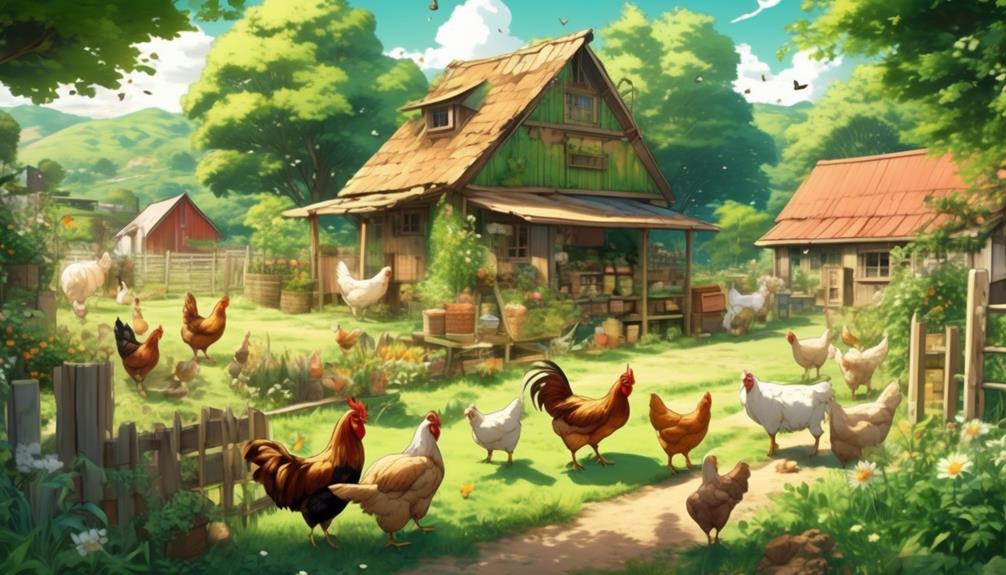Are you tired of relying on others for your food? Yearning for a more self-sufficient lifestyle? Look no further.
Imagine a world where you have complete control over your food sources, where you can raise animals that not only provide a continuous supply of meat and eggs but also contribute to your overall well-being.
From birds like chickens, quail, and ducks to larger animals like cows and pigs, there is a wide range of creatures that can help you achieve your self-sufficiency goals.
But why stop there? These animals offer more than just sustenance – they bring a sense of purpose, connection to the land, and a chance to live in harmony with nature.
So, if you’re ready to embark on this journey towards self-sufficiency, let’s explore the 16 animals that can help you turn your dreams into reality.
Livestock for Self-Sufficiency
- Raising livestock for self-sufficiency provides a constant supply of fresh eggs, meat, and other products.
- It offers additional benefits such as land clearing, pest control, and valuable manure for fertilizing gardens or crops.
- Raising livestock promotes sustainable practices and allows for the production of high-quality organic products.
- While there may be initial investments involved, raising livestock is cost-effective in the long run and can provide a valuable source of food in times of crisis or food shortages.
Why Raise Your Own Livestock?
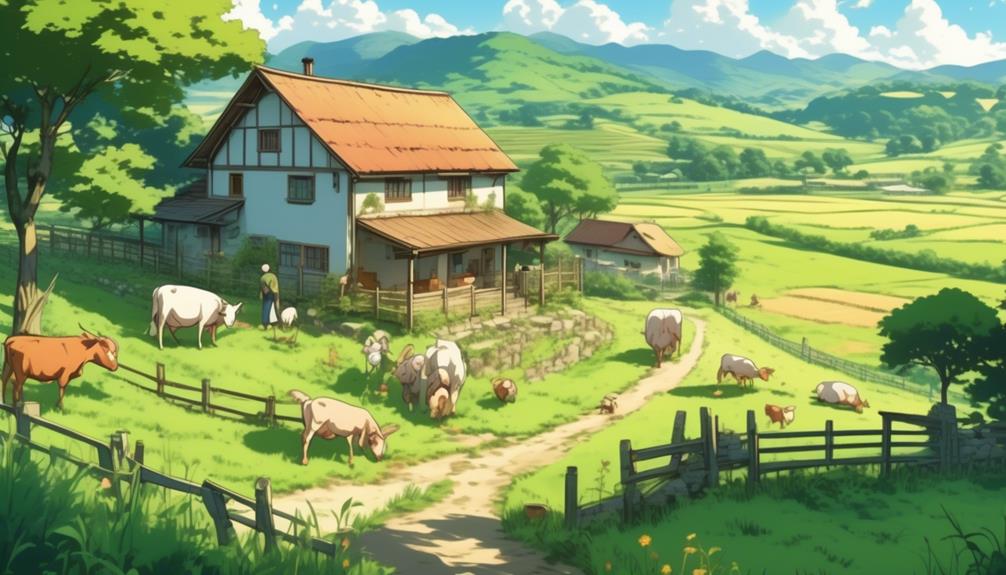
Raising your own livestock offers a multitude of benefits for self-sufficiency.
By raising animals like chickens, ducks, rabbits, and pigs, you can have a constant supply of fresh eggs, meat, and other products.
Additionally, livestock can help with land clearing, pest control, and provide valuable manure for fertilizing your gardens or crops.
Where to Start?
When embarking on your journey of raising your own livestock, starting small is a great way to ease into the process and gain valuable experience.
Begin by finding resources such as local farmers, online communities, and books that can provide guidance on animal care and management. When choosing ideal breeds, consider factors like climate suitability, disease resistance, and desired outputs such as meat, milk, or eggs.
Additionally, cost considerations play a crucial role in selecting livestock, as initial investments for housing, feed, and medical care can vary. It’s important to assess your space requirements, ensuring that you have enough land or a suitable setup to accommodate the animals comfortably.
Important Considerations
When considering the important aspects of raising your own livestock, it’s crucial to understand the key reasons why this endeavor can be beneficial for you and your self-sufficient lifestyle.
Starting livestock on your own land allows you to have control over the animal care and ensure sustainable practices. You can provide them with a natural diet and living conditions, resulting in high-quality, organic products.
Raising your own livestock can also be cost-effective in the long run, especially if you have the space and resources. By producing your own meat, eggs, and dairy, you reduce your dependence on external sources and ensure a continuous supply of food.
Additionally, raising animals connects you to nature and the food production process, fostering a more sustainable lifestyle. In times of crisis or food shortages, having your own source of food becomes invaluable for you and your family.
Researching and selecting the right livestock breeds for your needs is essential for maximizing the benefits of raising your own animals. So let’s jump right in and take a look at 16 different animals you can consider to raise for self-sufficiency.
Keeping Chickens
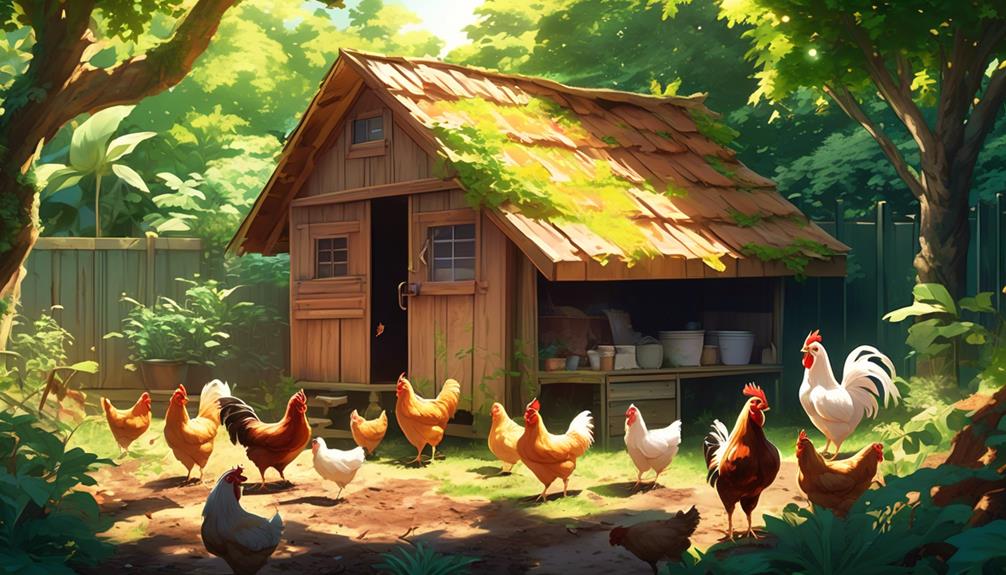
When it comes to keeping chickens, there are several advantages to consider.
First, chickens provide a constant supply of eggs, meat, and pest control, making them a valuable addition to a self-sufficient lifestyle.
Did you know that raising certain breeds of chickens can provide you with up to 300 eggs per year? This highlights the incredible potential for a continuous supply of fresh eggs right from your backyard or homestead.
However, it’s important to be aware of the potential disadvantages, such as noise and susceptibility to diseases.
Advantages of Raising Chickens
Raising chickens for self-sufficiency offers a multitude of advantages, from a constant supply of eggs and meat to efficient pest control and valuable fertilizer.
Chickens are low maintenance animals that can easily fit into a self-sufficient homestead. They are not only productive but also provide companionship and a sense of belonging.
Here are some key advantages of raising chickens:
| Advantages of Raising Chickens | |
|---|---|
| Constant supply of eggs | Chickens lay eggs almost every day, providing a reliable source of protein. |
| Meat production | Chickens can be raised for meat, offering a sustainable source of poultry. |
| Pest control | Chickens are natural bug and pest eaters, reducing the need for chemical pesticides. |
| Valuable fertilizer | Chicken manure is rich in nutrients and can be used to fertilize plants and improve soil quality. |
| Clearing ground | Chickens can be used to clear ground for planting crops, saving time and effort. |
Incorporating chickens into your self-sufficient lifestyle not only provides practical benefits but also adds a sense of purpose and connection to the natural world.
Disadvantages of Raising Chickens
While raising chickens for self-sufficiency offers numerous advantages, there are also some disadvantages to consider when keeping chickens. Here are three important factors to keep in mind:
- Health concerns: Chickens are susceptible to diseases and may require regular veterinary care. Ensuring their well-being can be a significant responsibility and may involve additional costs.
- Noise disturbances: Chickens can be noisy, especially when they’re laying eggs or being disturbed. If you live in a close-knit community or have neighbors in close proximity, the noise factor may cause disturbances and affect your relationship with those around you.
- Predators and security: Chickens are vulnerable to predators, such as foxes, raccoons, and even neighborhood dogs. Providing secure coops and enclosures is crucial to protect them from harm and ensure their safety.
Considering these factors, it’s important to understand that keeping chickens requires a time investment as well. You’ll need to allocate time for feeding, cleaning, and maintenance tasks to keep their living areas clean and hygienic.
Keeping Ducks

Keeping ducks on your homestead has several advantages.
Ducks lay fewer eggs than chickens, but the eggs are larger and more nutritious.
In addition to eggs, raising ducks can also provide meat, fat for cooking, weed control, companionship, and the opportunity to hatch and sell ducklings.
Ducks are also less prone to diseases compared to chickens, making them a beneficial choice for a self-sufficient homesteader.
Advantages of Raising Ducks
Ducks offer a multitude of advantages when it comes to achieving self-sufficiency on your homestead. Here are three reasons why raising ducks can be beneficial for you:
- Nutritional benefits: Ducks lay fewer eggs than chickens, but their larger and more nutritious eggs are an advantage. These eggs are packed with essential nutrients, including vitamins, minerals, and antioxidants, making them a valuable addition to your diet.
- Weed control: Ducks are excellent foragers and can help control weeds in your garden or pasture. They love to eat insects, slugs, snails, and other pests, reducing the need for chemical pesticides. By letting your ducks roam freely, you can keep your homestead weed-free while also providing them with a natural food source.
- Companionship and income: Raising ducks can be a rewarding experience as they’re social creatures and can provide companionship. Additionally, ducks can be a source of income as you can hatch and sell their ducklings to others interested in starting their own duck flocks.
With their disease resistance and ability to control weeds, ducks are a practical and reliable option for achieving self-sufficiency on your homestead.
Disadvantages of Raising Ducks
If you’re considering raising ducks on your homestead for self-sufficiency, it’s important to be aware of some potential drawbacks to keep in mind.
Ducks have specific housing requirements that need to be met in order for them to thrive. They require a sturdy and secure shelter to protect them from predators and the elements.
Ducks also need access to water for swimming and foraging.
When it comes to diet and nutrition, ducks require more feed compared to chickens, which can lead to higher maintenance costs. They can be messier than chickens, so you’ll need to put in extra effort to maintain cleanliness in their living space.
Ducks are also more susceptible to certain diseases compared to chickens, so regular health monitoring is important. Noise management can be a challenge, especially with female ducks, as they can be quite noisy.
Lastly, ducks take longer to start laying eggs compared to chickens, so you’ll need to be patient and implement strategies to encourage egg production.
Keeping Quail

When it comes to raising animals for self-sufficiency, keeping quail can be a practical and advantageous choice.
Quail are suitable for limited spaces and can be housed in cost-effective cages. They offer benefits such as low food consumption, hardiness, disease resistance, and the ability to provide eggs and meat for consumption.
Advantages of Raising Quail
Raising quail for self-sufficiency offers a multitude of advantages, making them a practical and cost-effective option for those with limited space or land.
Here are three key reasons why raising quail can be a beneficial choice:
- Easy for beginners: Quail are a great starting point for those new to animal raising. They’re low-maintenance, hardy, and require minimal care compared to other poultry. Their small size makes them manageable, and their quiet nature makes them suitable for urban settings.
- Alternative to chickens: If you have limited space or live in an urban area with restrictions on keeping chickens, quail can be a great alternative. They require less space, consume less food, and produce eggs at a rapid rate. Plus, their meat is lean and flavorful, making them a sustainable protein source.
- Sustainable protein source: Quail are efficient converters of food into meat, providing a sustainable source of protein. With their rapid breeding capabilities, you can have a continuous supply of eggs and meat. Their small size also means less land is needed for their housing, making them ideal for self-sufficiency in limited spaces.
Disadvantages of Raising Quail
While raising quail for self-sufficiency offers many advantages, it’s important to consider the potential disadvantages and challenges that come with keeping quail.
One challenge is finding suitable quail housing options. Quail are susceptible to predators, so proper housing and protection are essential.
Additionally, quail have specific feed requirements, needing a balanced diet of seeds, grains, and high-quality protein. Breeding considerations can also be a challenge, as quail require specific care and attention to ensure successful reproduction.
Health and disease management is another factor to consider, as quail are prone to certain illnesses and parasites. Lastly, quail egg production can be challenging due to their small size and lower egg yield compared to other poultry.
It’s crucial to weigh these factors when considering raising quail for self-sufficiency.
Keeping Geese

Keeping geese can be a valuable addition to your self-sufficient homestead.
They offer numerous advantages such as providing eggs, meat, feathers, weed control, companionship, and the ability to sell goslings.
However, it’s important to consider the disadvantages as well. Geese can be noisy and potentially aggressive. They also have higher feed requirements compared to chickens, so you’ll need to budget accordingly. Additionally, geese require proper protection and shelter to ensure their well-being.
Advantages of Raising Geese
With their versatility and ability to provide a consistent supply of eggs, meat, feathers, and companionship, geese offer numerous advantages for those seeking self-sufficiency. Here are three reasons why raising geese can be beneficial for your homestead:
- Weed Control: Geese are excellent at controlling weeds on your property. They have a voracious appetite for grass and can efficiently graze on unwanted plants, reducing the need for manual weeding.
- Self-Sufficiency: Raising geese contributes to your overall self-sufficiency efforts. They can be sold as goslings, providing an additional source of income, and their eggs and meat can be consumed or traded for other necessities.
- Adaptable to Different Homestead Setups: Geese are suitable for any size of land, making them adaptable to diverse homestead setups. Whether you have a large farm or a small backyard, geese can be successfully raised to meet your self-sufficiency goals.
Disadvantages of Raising Geese
Geese, although versatile and beneficial for self-sufficiency, come with several disadvantages that need to be considered.
Let’s take a closer look at the disadvantages of raising geese:
| Disadvantages | Description |
|---|---|
| Breeding Habits | Geese can be noisy, especially during breeding season, which can be disruptive in a residential area. Their aggressive behavior when protecting their nests and young can also pose a potential hazard to small children or pets. |
| Guard Animals | Geese can serve as guard animals, alerting you to potential predators. However, their protective nature can also make them aggressive towards humans or other animals, which may not be desirable for everyone. |
| Feed Requirements | Geese have higher feed requirements compared to chickens, increasing the cost of raising them. It’s important to ensure a balanced diet to meet their nutritional needs. |
| Shelter Needs | Geese need proper protection and shelter from predators. This may require additional infrastructure and maintenance, including fencing to keep them safe. |
| Behavior and Suitability | Geese may not be suitable for all self-sufficiency efforts due to their specific needs and behavior. It’s essential to understand their natural instincts and characteristics before deciding to raise them. |
While geese have their advantages, it’s important to carefully consider these disadvantages to make an informed decision about raising them for self-sufficiency.
Keeping Rabbits

If you’re considering raising animals for self-sufficiency, keeping rabbits can offer several advantages.
They’re suitable for small spaces and provide a continuous supply of meat, fur, and manure.
Rabbits are low-maintenance, reproduce quickly, and have low feed costs, making them a practical choice for those seeking self-sufficiency.
However, it’s important to be aware of the disadvantages, such as the need for proper housing, the potential for overbreeding, and the risk of diseases.
Advantages of Raising Rabbits
Raising rabbits for self-sufficiency offers a multitude of advantages, making them a practical and efficient choice for those seeking a low-cost and versatile animal to keep.
Here are three reasons why keeping rabbits can be advantageous for you:
1) High feed efficiency and quick reproduction: Rabbits are known for their ability to convert feed into meat efficiently. They’ve a high feed efficiency, meaning they require less feed compared to other animals for the same amount of meat produced. Additionally, rabbits have a short gestation period and can produce multiple litters in a year, allowing for a consistent meat source.
2) Versatile by-products: Raising rabbits not only provides a source of meat but also fur, which can be used for various crafts. The soft and warm fur can be turned into hats, gloves, and blankets, providing additional value from the animals.
3) Small space suitability: Rabbits can be raised in small spaces, making them an ideal choice for urban or limited land situations. With proper rabbit housing and management, you can keep them in your backyard or even indoors. This allows individuals with limited space to still enjoy the benefits of raising animals for self-sufficiency.
Disadvantages of Raising Rabbits
When considering the practicality of raising rabbits for self-sufficiency, it’s important to be aware of the potential disadvantages that come with keeping these versatile animals.
Challenges can arise when it comes to the health of rabbits. They’re susceptible to various diseases that can put their overall well-being at risk.
Additionally, rabbits are vulnerable to prey animals, which means that secure housing and protection from potential predators are necessary. Breeding issues can also be a concern, as overbreeding can lead to overcrowding and compromise the rabbits’ welfare.
Regular cleaning of rabbit housing is essential to maintain hygiene and prevent the spread of diseases. Furthermore, raising rabbits poses the risk of potential zoonotic diseases that can be transmitted to humans, emphasizing the importance of proper handling and hygiene practices.
Keeping Goats
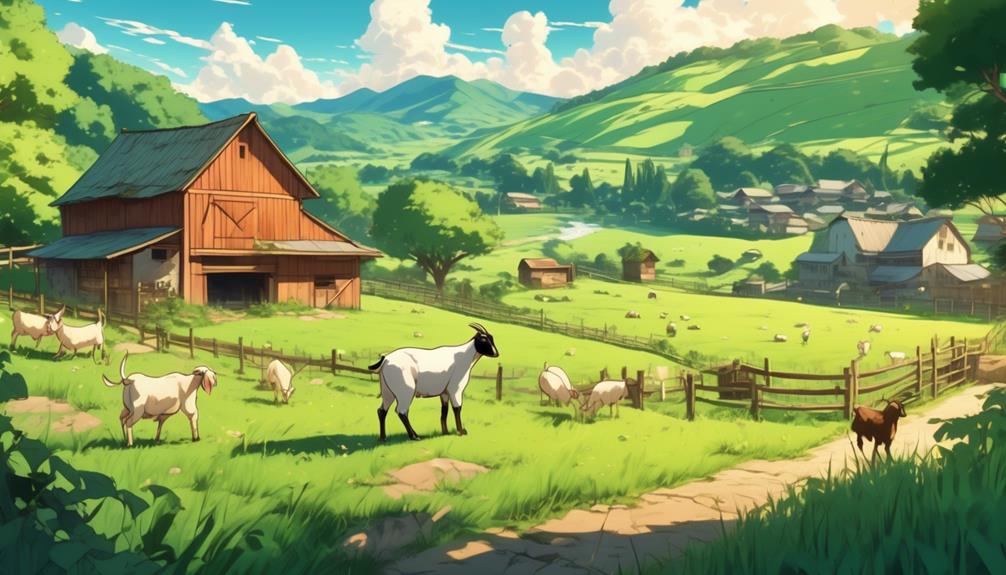
Keeping goats can be a valuable addition to your self-sufficiency efforts.
The advantages of raising goats include their ability to provide milk, meat, and fiber for crafts. They can also help with land clearing and offer companionship.
However, it’s important to consider the disadvantages as well, such as the need for proper fencing and the potential for escape. Regular hoof trimming is also necessary for their well-being.
Advantages of Raising Goats
Goats, with their versatility and numerous benefits, are an excellent choice for those seeking self-sufficiency. Here are three advantages of raising goats:
- Goat milk products: Goats are known for their high-quality milk, which can be used to make various dairy products like cheese, yogurt, and soap. Not only are these products delicious and nutritious, but they can also be sold for extra income.
- Goat meat: Goat meat, also known as chevon, is lean, flavorful, and widely consumed around the world. Raising goats for meat can provide a sustainable source of protein for your self-sufficiency efforts.
- Goat fiber: Certain goat breeds, such as Angora and Cashmere goats, produce luxurious fibers that can be spun into yarn and used for knitting or weaving. This can add an artistic and practical element to your self-sufficient lifestyle.
Disadvantages of Raising Goats
Now let’s explore the potential challenges that come with raising goats for self-sufficiency. While goats can offer numerous benefits, there are some disadvantages to consider.
Breeding challenges can arise, as goats can be noisy during their breeding season, which may not be desirable if you have close neighbors.
Additionally, goats are susceptible to various diseases and health issues, requiring regular monitoring and care to keep them healthy.
Fencing requirements are also a concern, as goats are known to be escape artists and require sturdy fencing to contain them.
The strong smell of male goats (bucks) can be off-putting and challenging to manage, especially in smaller spaces.
Finally, raising goats requires a significant time commitment, as regular hoof trimming and maintenance are necessary. Despite these challenges, with proper planning and management, raising goats can still be a rewarding endeavor.
Keeping Pigs
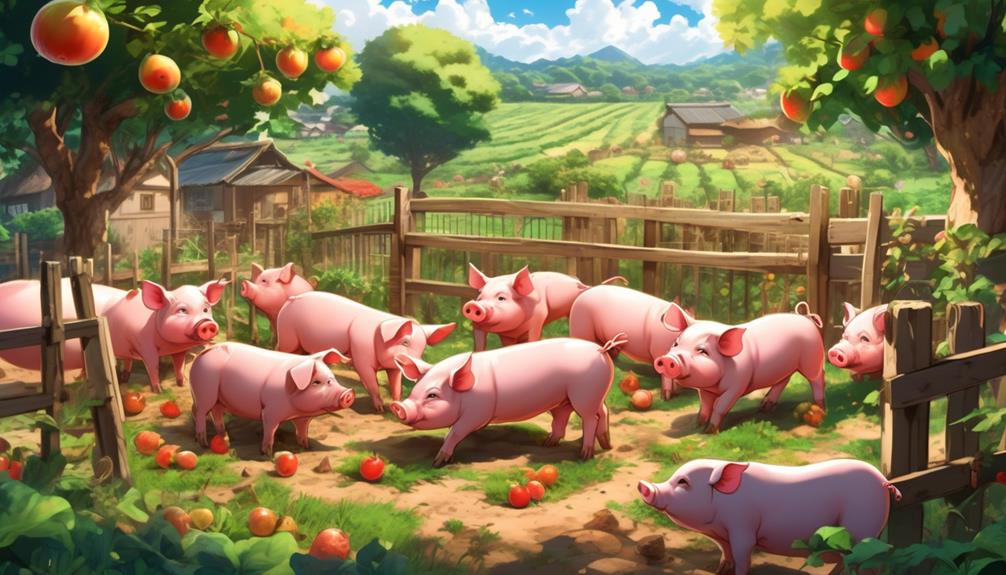
When it comes to keeping pigs for self-sufficiency, there are several advantages to consider.
Pigs are known for their ability to efficiently convert feed into meat, making them a valuable addition to any homestead. They also provide benefits such as land clearing, manure for fertilizer, and the potential for piglet sales.
However, it’s important to be aware of the challenges that come with raising pigs.
These challenges include the need for sturdy fencing, managing potential aggression, and providing enough space for them to roam.
Advantages of Raising Pigs
Raising pigs offers a multitude of advantages for those seeking self-sufficiency.
Here are three reasons why pigs can be a valuable addition to your self-sufficient lifestyle:
- Efficient Meat Production: Pigs are known for their ability to efficiently convert feed into meat. This means that you can raise them for a relatively low cost and have a steady supply of high-quality pork to feed your family.
- Land Clearing Assistance: Pigs are excellent at clearing land. Their natural instinct to root and dig can help you clear overgrown or wooded areas on your property, making it more suitable for other purposes such as gardening or pasture.
- Valuable Source of Manure: Pigs produce a significant amount of manure, which can be used as fertilizer for your crops or gardens. This natural fertilizer is rich in nutrients and can help improve soil fertility, leading to healthier and more abundant harvests.
Disadvantages of Raising Pigs
As you consider the advantages of raising pigs for self-sufficiency, it’s important to also be aware of the potential disadvantages that come with keeping these animals.
Challenges in caring for pigs include the need for sturdy fencing to contain them and prevent escapes, as well as the potential for aggression, which requires careful handling and management.
Another challenge is providing a balanced diet and addressing the nutritional needs of pigs, which can be demanding. Moreover, pigs require a significant amount of space to roam and forage, making it unsuitable for limited areas.
Lastly, pigs are susceptible to various diseases, necessitating regular health monitoring and proper care. It’s essential to thoroughly understand and address these challenges in the management of pigs to ensure their well-being and the success of your self-sufficient lifestyle.
Keeping Alpacas
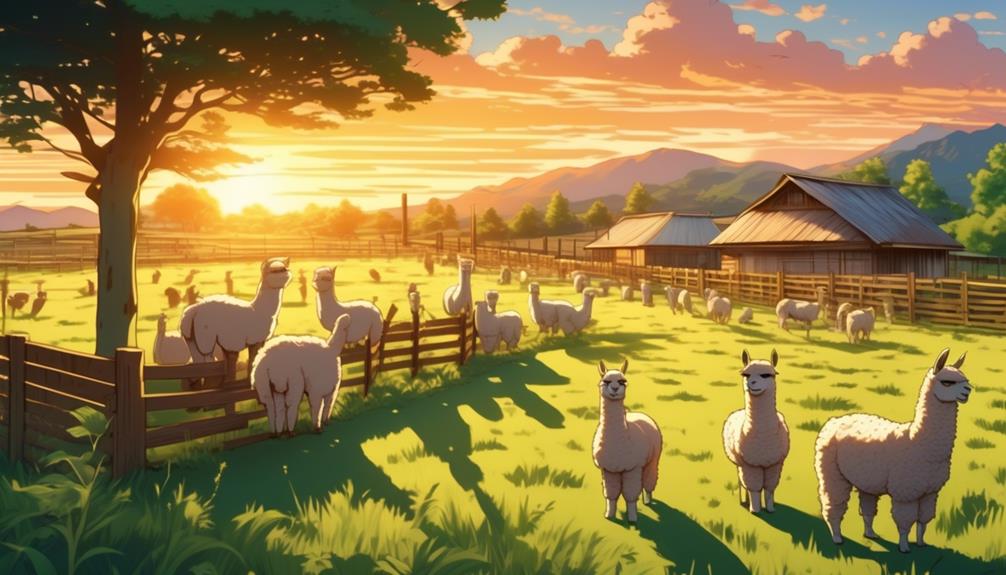
Keeping alpacas can be a valuable addition to your self-sufficiency efforts.
Their soft fiber provides a renewable source of material for yarn and clothing, making them a sustainable option for fiber production.
Alpacas are also relatively low-maintenance and gentle animals, making them easy to handle and suitable for small-scale farming.
Advantages of Keeping Alpacas
Alpacas offer a range of advantages for those seeking self-sufficiency, making them an ideal addition to any homestead or farm.
Here are three reasons why keeping alpacas can be beneficial for you:
- Alpaca fiber products: Alpacas produce luxurious, soft fiber that can be spun into yarn for knitting or crocheting. This fiber is highly sought after for its warmth and hypoallergenic properties. By keeping alpacas, you can have a sustainable source of fiber for your own crafting projects or even sell it to others.
- Alpaca care: These animals are low-maintenance and easy to care for. They have a gentle nature and don’t require much space or special facilities. With proper shelter, feeding, and regular health checks, alpacas can thrive on your self-sufficient farm.
- Alpaca health maintenance: Alpacas are hardy and resistant to many diseases, reducing the need for frequent veterinary visits and expenses. By practicing good herd management and providing them with a balanced diet, you can ensure their overall health and well-being.
Keeping alpacas on your homestead or farm can provide you with a sustainable source of fiber, easy care, and cost-effective health maintenance. These advantages make alpacas a valuable addition to any self-sufficient lifestyle.
Disadvantages of Keeping Alpacas
While there are numerous benefits to keeping alpacas for self-sufficiency, it is important to be aware of some potential disadvantages as well.
Alpacas require specialized care and knowledge, which can be challenging for beginners. They can also be expensive to purchase and maintain due to their specific dietary and medical needs.
Regular veterinary attention is needed to address health issues and parasites that alpacas are susceptible to. Additionally, the initial investment in infrastructure, such as shelters and fencing, can be significant for alpaca farming.
Breeding efforts may not always yield the desired results, as alpacas have a long gestation period. To give you a clearer picture, here is a table summarizing the drawbacks and advantages of keeping alpacas:
| Disadvantages | Advantages |
|---|---|
| Specialized care | Soft and luxurious fiber |
| High maintenance costs | Efficient feed conversion |
| Health issues | Cold climate resilience |
| Expensive infrastructure | Land clearing abilities |
| Uncertain breeding results | Alerting predators |
Considering these challenges and benefits, it is essential to carefully weigh the pros and cons before deciding to raise alpacas for self-sufficiency.
Keeping Pigeons

Keeping pigeons can be a valuable addition to your self-sufficient lifestyle. They provide a continuous supply of young birds for consumption and are low-maintenance animals.
With their ability to fly and forage for food, pigeons can contribute to your self-sufficiency by providing meat and being energy-efficient.
Advantages of Keeping Pigeons
With their continuous supply of young birds for consumption, pigeons offer a valuable advantage to those seeking self-sufficiency.
Here are three reasons why keeping pigeons can be beneficial for you:
- Breeding habits: Pigeons are prolific breeders, producing many young throughout the year. This means a constant source of fresh meat and eggs, allowing you to rely less on store-bought products.
- Nutritional benefits: Pigeon meat is lean and rich in protein, making it a healthy addition to your diet. It contains essential amino acids, vitamins, and minerals, providing you with the nutrients you need to thrive.
- Versatility of meat: Pigeon meat is versatile and can be used in a variety of dishes, from stews and stir-fries to roasts and kebabs. Its unique flavor adds depth to your meals and can satisfy even the most discerning palates.
Disadvantages of Keeping Pigeons
If you’re considering raising animals for self-sufficiency, it’s important to be aware of the potential disadvantages of keeping pigeons. Pigeons, like any other animal, have their own set of challenges that may affect your self-sufficiency efforts.
Here are a few things to consider:
| Disadvantages of Keeping Pigeons | |
|---|---|
| Pigeon diseases | Pigeons are susceptible to various diseases and require regular monitoring and care to ensure their health. This includes vaccinations, proper nutrition, and maintaining a clean environment. Neglecting their health can lead to illness and even death. |
| Predator risks | Keeping pigeons may attract predators such as hawks, cats, and rats, posing a risk to their safety. It’s essential to provide adequate protection, such as secure housing and netting, to minimize the risk of predation. |
| Urban noise | Pigeons can be noisy, especially if they are kept in urban or densely populated areas. This can be a nuisance to you and your neighbors, potentially causing conflicts. Consider the noise factor before deciding to keep pigeons in such settings. |
In addition to these challenges, pigeons also have specific housing requirements that need to be met, and their keeping may not align with diverse self-sufficiency efforts due to their limitations.
It’s important to weigh the disadvantages against the benefits and make an informed decision that suits your self-sufficiency goals.
Keeping Cows
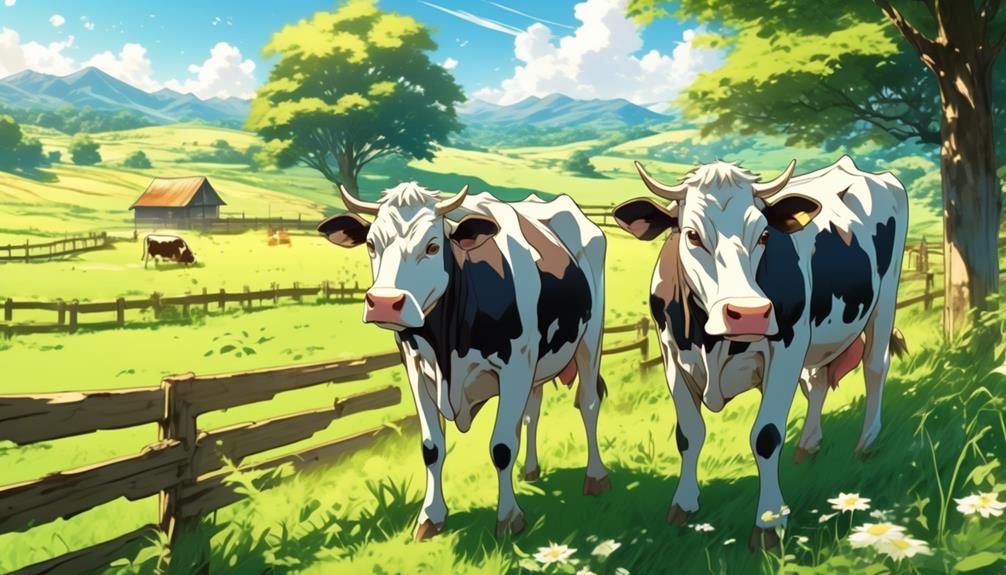
Keeping cows can be a valuable addition to your self-sufficiency efforts. Cows offer numerous advantages such as a sustainable source of milk, meat, and draft power.
However, it’s important to consider the disadvantages too. One disadvantage is the need for large pasture areas to provide sufficient grazing space for the cows. Another disadvantage is the cost of winter feed, as cows require additional food during the colder months when pasture is not available.
In addition, it’s important to note that cows take time to mature before they become productive. This means that there will be a waiting period before you can start benefiting from the milk, meat, or draft power that cows can provide.
Advantages of Raising Cows
Raising cows for self-sufficiency offers a multitude of advantages, making them an invaluable asset to your homestead. Here are three reasons why keeping cows can greatly benefit your self-sufficient lifestyle:
- Maximize Milk Production: Cows are excellent milk producers, and by implementing proper management practices, you can maximize their milk production. By providing a balanced diet, regular milking, and proper hygiene, you can ensure a continuous supply of fresh milk for your family’s consumption.
- Natural Fertilizer: Cow manure is a valuable resource for sustainable agriculture. It can be used as a natural fertilizer to enrich the soil, improve its fertility, and promote healthy plant growth. By utilizing cow manure, you can reduce the need for chemical fertilizers and create a more eco-friendly farming system.
- Additional Income: Selling cow calves can provide an economic advantage to your self-sufficiency efforts. By selectively breeding your cows and selling the offspring, you can generate an additional source of income for your homestead. This extra income can help cover expenses or invest in other areas of self-sufficiency.
Disadvantages of Raising Cows
When considering the challenges of maintaining a self-sufficient lifestyle, it’s important to be aware of the potential drawbacks associated with raising cows on your homestead.
While cows offer numerous benefits, there are some limitations to keep in mind.
One challenge is the amount of space they require. Cows need large pasture areas, making them impractical for those with limited land.
Additionally, the cost of feed during the winter months can be substantial, which can impact your self-sufficiency efforts. Another drawback is the need for proper handling facilities. This adds to the infrastructure required for raising cows.
Moreover, cows take a significant amount of time to mature, delaying the benefits of milk and meat production. Lastly, cows are susceptible to various health issues, which further adds to the challenges of raising them.
Being aware of these drawbacks can help you make informed decisions about raising cows on your homestead.
Keeping Bees

Keeping bees can be a valuable addition to your self-sufficient lifestyle.
The advantages of keeping bees include the production of honey, beeswax, and pollination services for your garden and crops.
However, it’s important to be aware of the potential disadvantages such as the need for initial infrastructure, regular maintenance, and the risk of bee stings.
Advantages of Keeping Bees
One of the most advantageous aspects of beekeeping is the constant supply of honey and beeswax it provides for self-sufficiency.
Not only do bees play a crucial role in pollinating plants, contributing to increased crop yield, but keeping bees can also generate potential income from selling honey, beeswax products, and even bees themselves.
Here are three key advantages of keeping bees for self-sufficiency:
- Increased crop yield: Bees are responsible for pollinating a wide variety of plants, including fruits, vegetables, and nuts. By keeping bees, you ensure a reliable source of pollination that can significantly enhance the productivity of your garden or orchard.
- Potential income: The surplus honey and beeswax produced by your bees can be sold, providing an additional source of income. Additionally, you can offer pollination services to local farmers, further boosting your financial stability.
- Low maintenance: While beekeeping requires proper equipment and hive maintenance, it’s relatively low-maintenance compared to other livestock. Bees require minimal time and upkeep, making them an accessible addition to your self-sufficient lifestyle.
With these advantages, beekeeping offers not only a sweet reward but also a valuable contribution to your self-sufficient homestead.
Disadvantages of Keeping Bees
Beekeeping, although rewarding, does come with its fair share of challenges and potential drawbacks. Before you decide to keep bees, it’s important to be aware of the risks and disadvantages involved.
Here are some key points to consider:
| Disadvantage | Description |
|---|---|
| Risk of bee stings | When keeping bees, there is always a risk of getting stung. This can be a concern, especially if you or someone in your household is allergic to bee stings. Proper protective clothing and precautions can help minimize the risk. |
| Hive maintenance | Beekeeping requires regular hive maintenance to ensure the health and productivity of the colony. This includes inspecting the hive, monitoring for pests and diseases, and providing adequate food and water. It can be time-consuming and requires dedication and attention to detail. |
| Diseases | Bees are susceptible to various diseases that can quickly spread and devastate the entire hive. It is crucial to have knowledge and experience in identifying and managing these diseases to protect your bees and maintain a healthy colony. |
| Workload | Beekeeping is not a passive activity. It requires consistent and ongoing effort. You will need to invest time and energy in tasks such as hive maintenance, honey extraction, and winter preparations. It is important to be prepared for the workload that comes with keeping bees. |
Understanding these disadvantages will help you make an informed decision about whether beekeeping is right for you. While the rewards can be great, it is important to weigh them against the challenges and be prepared to invest the necessary time, effort, and knowledge into maintaining a healthy and thriving hive.
Keeping Fish

When it comes to keeping fish for self-sufficiency, there are several advantages to consider.
Fish can be raised in ponds or tanks, providing a constant supply of protein for your diet.
Additionally, raising fish can also offer potential income from selling them and the use of fish waste as fertilizer.
However, it’s important to note that proper water management is crucial for successful fish farming, and setting up a fish farm may require an initial investment.
Advantages of Keeping Fish
Keeping fish for self-sufficiency offers a range of advantages that can contribute to a sustainable and thriving lifestyle. Here are three reasons why raising fish can be beneficial:
- Profitability: Raising fish can provide potential income through selling fish and using fish waste as fertilizer. With proper management, you can create a profitable venture that supports your self-sufficient lifestyle.
- Educational opportunities: Keeping fish offers the opportunity to learn about aquaculture. You can gain knowledge about fish behavior, breeding techniques, and water quality management. This educational aspect can be fulfilling and contribute to your sense of self-sufficiency.
- Climate considerations: Various fish species can be grown based on your climate and preferences. With careful research and planning, you can select fish that are well-suited to your local conditions. This ensures that your fish thrive and contribute to a successful self-sufficient system.
Disadvantages of Keeping Fish
One important consideration when raising fish for self-sufficiency is understanding the potential disadvantages that come with it. Fish farming poses several challenges that can impact the success of your venture.
One such challenge is the impact of overcrowding in fish farms. When fish are overcrowded, it can lead to a higher risk of diseases among the fish population, which can result in significant losses.
Additionally, fish have specific nutritional requirements that must be met to ensure their growth and development. Regular feeding is necessary to provide them with adequate nutrition.
Moreover, setting up a fish farm requires an initial investment for equipment and infrastructure, which can be costly.
Lastly, fish farming is dependent on controlled aquatic environments, which means you need to maintain the right conditions for the fish to thrive.
Keeping Sheep
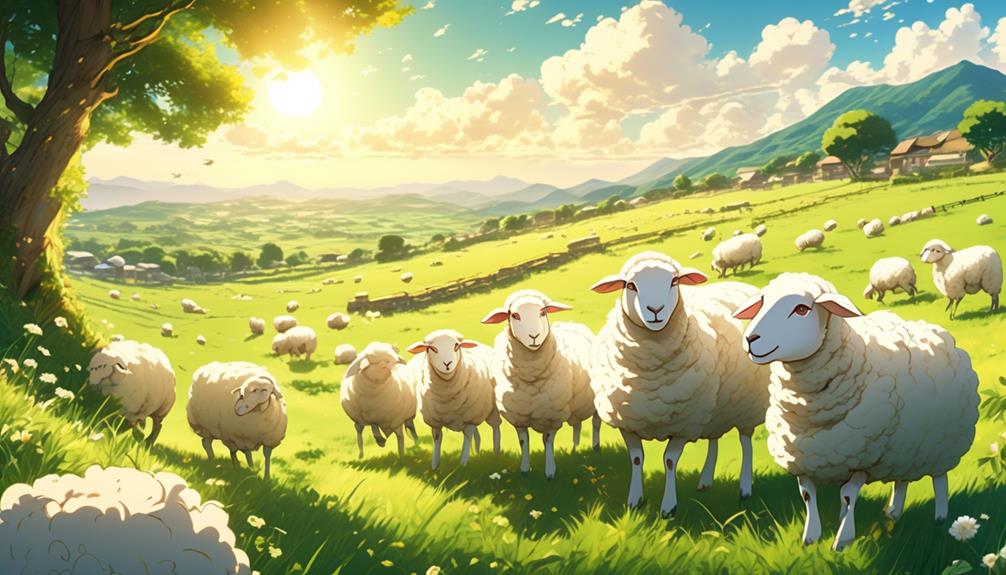
Keeping sheep can be a beneficial addition to your self-sufficiency efforts. Sheep provide a valuable source of wool, which can be used for various purposes and even sold for additional income.
They also offer a self-sufficient source of protein through their meat, and their grazing habits contribute to land maintenance and management.
Advantages of Keeping Sheep
Sheep offer a multitude of advantages for those seeking to achieve self-sufficiency through animal husbandry.
Here are three reasons why keeping sheep can be beneficial for your self-sufficient lifestyle:
- Wool Production: Sheep are low-maintenance animals that provide a valuable resource – wool. By raising sheep, you can harvest their wool and use it to make warm clothing, blankets, and other wool products. This not only saves you money but also gives you a sense of pride in producing your own sustainable materials.
- Meat and Milk Supply: Sheep can be raised for both meat and milk. Their meat is lean and flavorful, making it a great addition to your self-sufficient diet. Additionally, sheep’s milk can be used to make cheese, butter, and other dairy products, further enhancing your self-sufficiency.
- Pasture Maintenance: Sheep are efficient grazers and can help maintain your pasture by grazing on grass and weeds. This reduces the need for mowing or using chemical herbicides, creating a more sustainable and eco-friendly environment.
Disadvantages of Keeping Sheep
When considering the challenges of raising animals for self-sufficiency, it’s important to be aware of the potential drawbacks that come with keeping sheep. One major concern is their susceptibility to various health issues, which require regular monitoring and care.
Additionally, predators pose a significant threat to sheep, making effective pest control measures essential. Unlike other animals, sheep often require specialized infrastructure and facilities, such as shearing sheds and handling equipment. This can add to the overall cost and complexity of raising sheep.
Furthermore, handling sheep can be quite challenging, especially during lambing and shearing seasons. Lastly, sheep may take a longer time to reach maturity and produce marketable products compared to other livestock, requiring patience and investment of time before seeing returns.
Keeping Donkeys, Mules and Horses

Keeping donkeys, mules, and horses on your self-sufficient homestead can offer numerous advantages. They can provide transportation, assist with work tasks, and offer protection to other livestock.
However, there are also some disadvantages to consider, such as the need for adequate fencing and the requirement of proper care and attention.
Despite these challenges, donkeys, mules, and horses can be valuable additions to your self-sufficiency efforts.
Advantages of Keeping Donkeys, Mules and Horses
Donkeys, mules, and horses offer valuable advantages when it comes to self-sufficiency, making them a valuable addition to your homestead. Here are three reasons why:
- Versatility: These equine animals are suitable for a variety of uses, such as land work and transportation. They can assist in clearing land, which is essential for expanding your self-sufficient homestead. Donkeys, mules, and horses are sustainable options for those with larger land areas, providing a means of transportation without relying on fossil fuels.
- Manure production: These animals produce valuable manure, which can be used as fertilizer for your crops. This natural fertilizer is rich in nutrients and can help improve soil quality, ensuring a bountiful harvest for your self-sufficient lifestyle.
- Protection: Donkeys, mules, and horses can serve as burden animals and protect other livestock. Their presence can deter predators, keeping your animals safe and secure.
Disadvantages of Keeping Donkeys, Mules and Horses
While there are numerous advantages to keeping donkeys, mules, and horses for self-sufficiency, it’s important to consider the potential disadvantages as well.
These animals can pose training challenges, requiring additional time and effort to properly handle and work with.
Moreover, donkeys, mules, and horses are prone to various health issues, leading to regular veterinary expenses and increasing the overall maintenance costs.
Additionally, these animals need ample space for exercise and grazing, which can be a challenge for homesteads with limited land.
Furthermore, it’s important to understand that donkeys, mules, and horses have a long lifespan, requiring a long-term commitment. This may not be suitable for those seeking short-term benefits or individuals who aren’t willing to make a lasting investment.
It’s essential to consider these factors before deciding to keep donkeys, mules, and horses for self-sufficiency.
Keeping Guinea Fowl
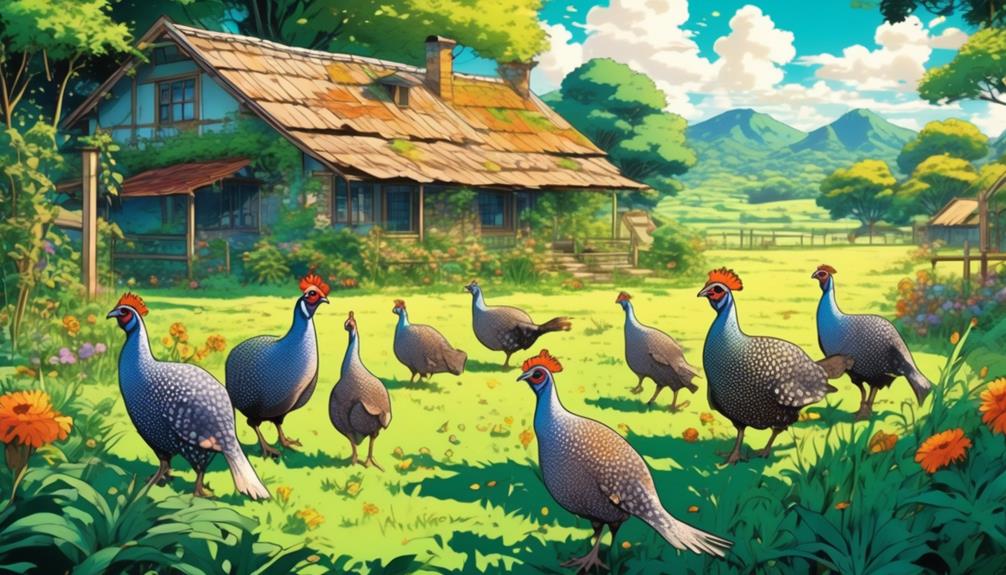
Keeping Guinea Fowl can be a valuable addition to your self-sufficiency efforts.
These birds are excellent at controlling pests like ticks, bugs, slugs, and snails, making them a natural pest control solution.
However, it’s important to note that Guinea fowl lay eggs seasonally and require proper protection and shelter to thrive.
Advantages of Keeping Guinea Fowl
Guinea fowl, with their exceptional pest control abilities and seasonal egg production, offer valuable advantages for those seeking self-sufficiency.
Here are three reasons why keeping guinea fowl can be beneficial for your self-sufficient lifestyle:
- Effective Pest Control: Guinea fowl are natural bug hunters, devouring ticks, bugs, slugs, and snails with gusto. By keeping guinea fowl on your homestead, you can maintain a pest-free environment without the need for harmful pesticides.
- Seasonal Egg Production: While guinea fowl lay eggs seasonally, they still provide an additional source of protein for your self-sufficiency efforts. These eggs can be a nutritious addition to your diet and can be used in various recipes.
- Hardy Birds: Guinea fowl are known for their resilience and ability to withstand various climates. Whether you live in a cold or hot region, these birds can adapt and thrive, making them suitable for self-sufficient homesteads.
Disadvantages of Keeping Guinea Fowl
One downside to raising guinea fowl for self-sufficiency is their tendency to be noisy, which may not be suitable for all environments. Guinea fowl can produce loud, high-pitched calls that can be disruptive to the peace and quiet of your surroundings.
Additionally, there are a few other disadvantages to consider when raising guinea fowl.
Firstly, they are susceptible to diseases and health concerns, which require regular monitoring and care to ensure their well-being. Secondly, guinea fowl may not start laying eggs as quickly as other poultry, requiring patience for egg production.
Furthermore, guinea fowl have specific housing requirements to protect them from predators and keep them safe. Lastly, raising guinea fowl may require additional effort and resources compared to other fowl, making resource allocation an important consideration.
Keeping Llamas

Keeping llamas can be a valuable addition to your self-sufficiency efforts.
These hardy animals offer advantages such as their adaptability to various climates and terrains, their ability to produce warm and soft wool, and their effectiveness as guardians against predators.
Additionally, llamas can serve as reliable pack animals, carrying heavy loads for long distances. Considering their low maintenance requirements, keeping llamas can be a practical and beneficial choice for those seeking self-sufficiency.
Advantages of Keeping Llamas
Llamas offer a multitude of advantages for those seeking to achieve self-sufficiency on their homestead. Here are three reasons why keeping llamas can be beneficial:
- Guardian Protection: Llamas are exceptional guard animals, diligently protecting other livestock from predators like coyotes and dogs. Their alertness and fighting skills reduce the risk of predation, providing a sense of security and peace of mind.
- Versatile Wool: Llamas provide high-quality wool that can be used for various purposes. From crafts to clothing, their wool is soft, warm, and highly sought after. You can either use it yourself or sell it for additional income, further supporting your self-sufficient lifestyle.
- Practical Packing: Llamas can be trained to carry heavy loads, making them excellent pack animals. Whether you need to transport supplies or equipment around your homestead, llamas offer a practical and sustainable solution. Their strength and endurance make them reliable companions in your self-sufficiency journey.
Furthermore, llamas are low-maintenance animals that can thrive in different climates, making them adaptable to various homesteading situations. With their numerous advantages, llamas are a valuable addition to any self-sufficient homestead.
Disadvantages of Keeping Llamas
When considering the challenges of raising llamas for self-sufficiency, it is important to be aware of certain disadvantages that may arise.
Llamas require a significant amount of space to roam and graze, making them unsuitable for small properties. Additionally, they have specific nutritional needs, which can be challenging to fulfill, particularly in areas with limited vegetation.
Llamas can also be territorial and may not get along with other livestock, posing a challenge for mixed animal farming. Furthermore, llamas are sensitive to certain parasites and diseases, necessitating regular veterinary care and preventative measures.
Lastly, llamas are known for their strong personalities and can be difficult to handle and train, especially for novice animal keepers.
Livestock Choices
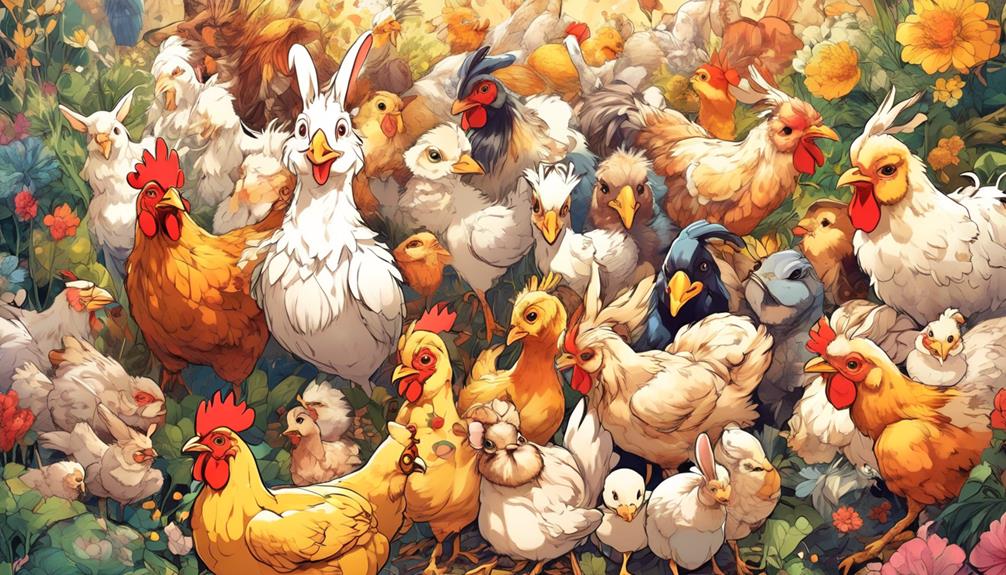
Carefully considering the advantages and challenges of raising animals for self-sufficiency is crucial in order to make informed decisions that align with your specific needs and goals. By weighing the pros and cons of raising livestock, you can determine if it’s the right choice for you.
Consider the space limitations you have and choose animals that are suitable for limited spaces. Birds like pigeons, quail, and chickens can thrive in smaller areas and provide a continuous supply of eggs and meat. Additionally, rabbits are compact and can be raised in a small backyard, providing a sustainable source of meat.
Animal health plays a vital role in achieving self-sufficiency.
It’s important to prioritize the well-being of your animals by providing proper nutrition, regular veterinary care, and a clean environment. Healthy animals are more productive and less prone to diseases, ensuring a steady supply of food and resources.
Integrating animal raising into a self-sufficient lifestyle requires careful planning. Consider factors like available space, climate, and personal preferences when choosing the animals to raise.
Create a comprehensive plan that takes into account the specific needs and care requirements of each animal. This will contribute to a balanced and efficient approach to animal-raising.
Frequently Asked Questions
What Types of Animals Are Best for a Self Sufficient Farm?
If you’re looking to create a self-sufficient farm, there are a few animals that can help you achieve that goal.
Chickens are a great option, providing you with fresh eggs and meat, while also keeping pests at bay.
Beekeeping is another fantastic choice, as bees help with pollination and honey production.
Goats are versatile animals that can provide milk, meat, and help clear land.
And don’t forget about fish farming, which can give you a sustainable source of protein.
Lastly, rabbits are low-maintenance and can provide meat and fur for your self-sufficient lifestyle.
What Is the Lowest Maintenance Farm Animal?
The lowest maintenance farm animal is the chicken.
They’re great for self-sufficiency because they can forage for food, provide a constant supply of eggs, and require minimal care. They can even process kitchen scraps and help control bugs and weeds in the garden.
Chickens can be kept in a chicken coop and run, making them a convenient option. Ducks and quail are also low-maintenance alternatives, suitable for urban homesteads.
Bees are another option, requiring minimal feed and providing honey once the initial infrastructure is built.
What Is the Most Profitable Animal to Raise?
If you’re looking for the most profitable animal to raise, there are a few factors to consider.
One interesting statistic to start is that according to research, goats can generate a higher profit margin compared to other livestock options.
However, profitability in animal farming depends on various factors such as market demand, feed costs, and initial investment.
To maximize profits, strategies like proper breeding, efficient feed management, and marketing techniques can be employed.
It’s also worth exploring emerging trends in profitable animal agriculture, such as organic and specialty meat production.
What Is the Cheapest Animal to Raise?
The cheapest animal to raise for self-sufficiency is the chicken.
They’re cost-effective livestock that offer a constant supply of eggs, meat, pest control, and garden manure.
Chickens are perfect for budget-friendly farming and affordable self-sufficiency. They’re easy to care for and provide multiple benefits.
With their low initial investment and ability to thrive in various environments, chickens are a practical choice for anyone looking to embrace economical animal husbandry.
Overall…
Raising animals for self-sufficiency offers a multitude of benefits. By taking control of your food sources and raising animals like chickens, ducks, or quail, you can enjoy the rewards of a self-sufficient lifestyle while increasing your protein intake and reducing reliance on grocery stores.
